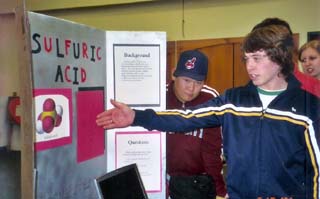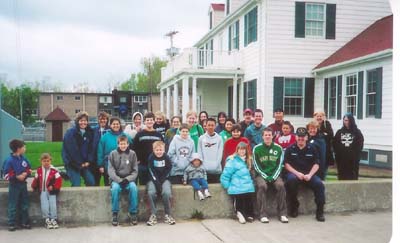
While many children roll out of bed, get dressed, prepare for school and head out the door to the school bus, some children skip the school bus routine and head to the kitchen table for their reading, writing and arithmetic lessons. For Rick and Amy Stacy the decision to home school their children was made before the children were born. “Before we got married, we discussed child reading issues,” Amy said. “Rick’s sisters were home schooling and he really liked what they were doing and that was the beginning.” Parents opt for home schooling for a variety of reasons, some because they are unhappy with the peer pressures their children face, they believe there is a lack of personalized attention given in public schools or for religious reasons. For Marcy and Kevin Johnson their faith is an “integral part” of their lives. ‘We felt it (our faith) needed to be intrinsic to their (the children’s) schooling as well,” Marcy said. “We saw private education as a choice, but believed even more strongly in the advantages of home schooling.” Additionally, home schooling is often chosen for educational reasons above all else. Johnson said she felt her children needed more personalized attention than what was given in a classroom setting. “At traditional schools, you have teachers and students at cross purposes,” Johnson said. “Teachers are trying to teach and children are trying to socialize so there is always a conflict.” When asked if it was a monumental task to consider home schooling, Stacy said that she has her master’s in education so knew she could offer her children a strong foundation. “At first we kept the kids home for kindergarten, then we sent them to the LeRoy Holy Family School (the Stacy’s aren’t Catholic but Amy said they appreciated the Christian perspective offered at the school). The older two boys went there through sixth grade and then I home schooled them through high school,” she said. The Stacys have four children: Daniel, Ryan, David and Janae. They have all been homeschooled at various stages throughout their lives, Amy said. Johnson said at first it seemed like a mammoth endeavor. “But like any new job, when you set your mind on a goal and work towards it, the rewards are great,” she said. “We have never regretted a day we’ve spent in our home school, as the fruits of our efforts are immeasurable. We have a happy, loving home with parents and children alike respecting each other, communicating about everything, and growing together. I’ve always said I learn as much as the children do each day - but in different areas, especially patience and how to juggle five things at once and maintain the peace and flow of the day.” The Johnsons home schooled all four of their children. Their eldest, Kevin, was partly home schooled in grammar school. He is now a UB law student in his second year. Mary, home schooled from kindergarten through eighth grade, has a master’s degree in physical therapy from Nazareth College and works at the CP Center of Rochester. Greta, who home schooled from kindergarten until graduation, graduated home school with 29 college credits under her belt. She started college classes at Nazareth when she was a junior in high school. David, a sophomore in home school, will finish his high school studies at home and will start some college classes next year. David said he will begin studying at St. John Fisher College next year to get some college classes under his belt before graduation. He thinks he wants to pursue a career in occupational therapy. Parents who home school their children also mention it’s a way to shield the children from peer pressure as it relates to drugs, sex and other situations that may not meld with the values the parents are trying to impart. Amy Stacy says that she and Rick think the benefits of home schooling are significant. “It allows us to spend a lot of time with our children. We are very aware of how they spend their time, who their friends are and we have been able to decrease negative peer pressure,” she said. For the Johnsons, a typical day starts at 8:30 a.m., unless it is basketball season, which starts with a 6 to 8 a.m. practice three mornings a week at the downtown YMCA. “We start with Bible reading, study and prayer, then dig in to the subjects being studied that semester. I allow the child choice with my recommendations as to how to order the day, and by the high school age you as a parent have become a side-by-side learner, reading and directing the child as you learn yourself,” Marcy said. “Teacher’s guides and manuals, and answer keys help save time. Some courses that can be purchased are designed for the home schooler, allowing the child to work very independently in a subject they enjoy and understand easily. Tougher subjects require more parental involvement.” For David Johnson, 15, there have been brief moments of wishing he could join his friends on the school bus and go to a classroom but for the most part he enjoys home schooling. “Sure there have been times I wish I could have gone to school but mostly I like being home,” he said. “It’s a much more comfortable atmosphere and I get to study on my schedule instead of having to wait for people to catch up in a classroom. It’s easier and quicker because I can work at my own pace and study things that I am interested in.” Because David attends a couple of programs a week at LEAH (Loving Education at Home), he has exposure to a classroom setting and to working with other students his age. “We go in and learn from other parents on subjects that either my mom might not have as much knowledge in or a subject that I am interested in,” he said. By the numbers The pluses and minuses Music lessons are easier to integrate into a child’s life as there are many individuals who offer private lessons. Home schooling allows students to study what they want, when they want, for as long as they want. In addition to state requirements, a child’s age, emotion and interest levels play a role in what they study. Family vacations, doctor’s appointments and other family obligations don’t have to be ruled by a school calendar. Parents of home schooled children also face expenses that parents of children who attend public schools don’t have to contend with. “We pay school taxes but still have to purchase our own supplies and course books,” Stacy said. When considering home schooling, a parent must make sure they are qualified and will have the time to teach their children - working full-time likely wouldn’t lend itself to a home schooling arrangement. Being together 24 hours a day, seven days a week, 365 days a year is also something a family needs to consider. Communication problems can carry over from “non-school” hours to the classroom setting and need to be addressed. Support systems Being part of a home school organization offers a chance for the children to mix and mingle with their peers. “Honestly, I think there is too much emphasis put on socialization when the most important aspect of school should be the academics,” Stacy said. “Socialization” is one of the questions raised to parents of home schoolers, both Marcy and Amy said. “At home we can compartmentalize learning and socialization, making a more effective use of time,” Marcy said. As for the children becoming “socialized,” Johnson said her children are youth leaders, leaders in music ministry and lead music for a service at The Landing residential facility in Brockport each month. The Johnsons’ sons, Kevin and David, are a captain in the Brockport Fire Department and a Brockport Fire Department Explorer, respectively. “The comment I have often heard is how well home schooled children socialize in that they are not confined to socialize mostly with their same age peers, but are always around younger and older children, and adults, too, and speak easily and freely with people of all ages. They learn to care for the little ones, listen and learn from the older ones, and model their parents in a respectful and honoring way.” Support from the school systems In Brockport, Michelle Turner, director of curriculum and assessment, who oversees the home schooling program, says, “We encourage families who are home schooling to come in and meet with us so we can assist them in completing the necessary paperwork. Most families are very self sufficient, though, or they get help from local support groups.” In high school, children must take a standardized test in an appropriate manner each year and the results must be sent to the school district. “Each year, home schooled students are required to complete an annual assessment in either a narrative format or a standardized test,” Turner said. “Students who fall below the federal results in either type or assessment have their programs put on probation.” Beyond the high school years The Stacys and Johnsons are in good company with home schooling their children as Abraham Lincoln, George Washington, Albert Einstein and Thomas Edison are among some of the great Americans who have been home schooled.
October 29, 2006 |

